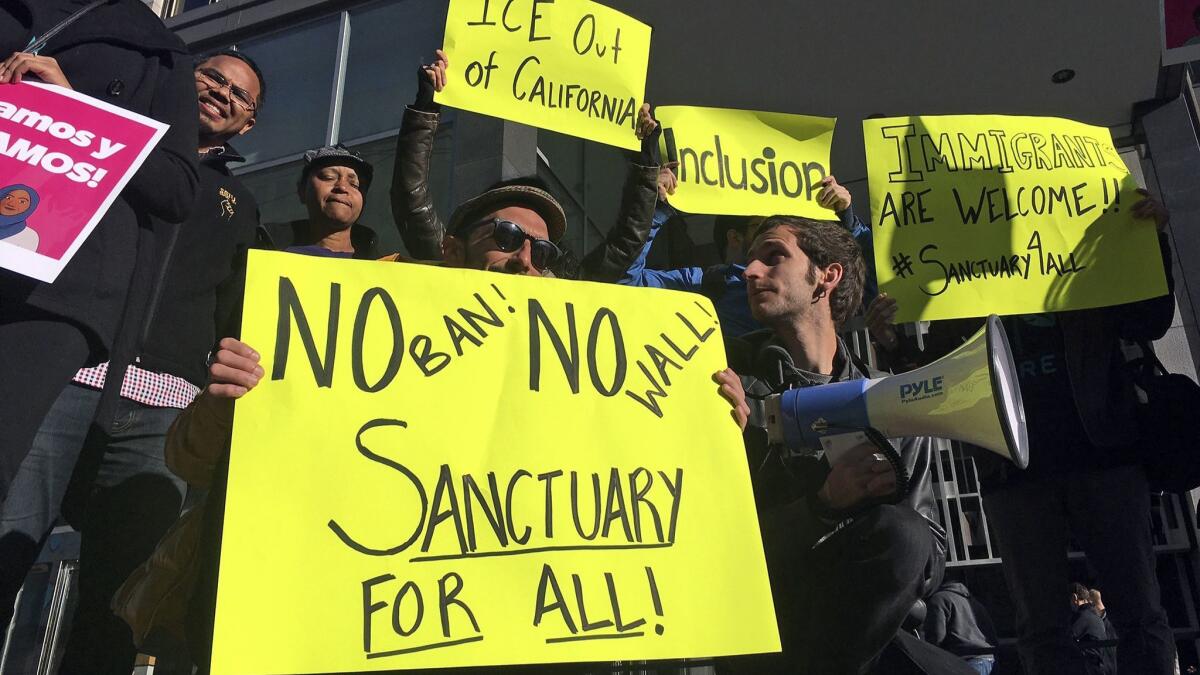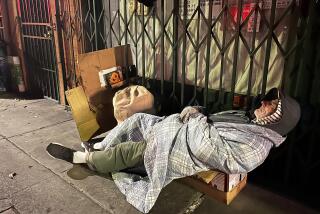Appeals court rules Trump can’t withhold funds from California ‘sanctuary’ cities

A federal appeals court decided Wednesday that the Trump administration may not withhold federal funds from California’s immigrant-friendly “sanctuary” cities and counties.
The U.S. 9th Circuit Court of Appeals, in a 2-1 decision, upheld a district judge’s ruling in favor of San Francisco and Santa Clara County, which sued over the administration’s threats to withhold money to jurisdictions that have passed laws limiting local law enforcement cooperation with federal immigration authorities.
The ruling was a blow to the Trump administration’s efforts to punish cities and states that fail to help enforce federal immigration law, a goal President Trump announced shortly after he was sworn in.
The administration did not comment on whether it intended to appeal the decision.
But the 9th Circuit handed Trump one victory. It removed a nationwide injunction against his directive, concluding there was not enough evidence presented in the case so far to support blocking it beyond California.
Devin O’Malley, a spokesman for the U.S. Department of Justice, called the ruling a “a victory for criminal aliens in California, who can continue to commit crimes knowing that the state’s leadership will protect them from federal immigration officers.”
O’Malley also declared that the removal of the nationwide injunction amounted to “another major victory for the rule of law.”
The case stemmed from an executive order issued by Trump shortly after taking office. He directed his administration to withhold federal funds from sanctuary jurisdictions.
The 9th Circuit said Trump exceeded his authority because only Congress can put conditions on federal funds.
“The United States Constitution exclusively grants the power of the purse to Congress, not the President,” wrote Chief 9th Circuit Judge Sidney R. Thomas, a Clinton appointee.
The administration argued that the order was “all bluster and no bite, representing a perfectly legitimate use of the presidential ‘bully pulpit,’ without any real meaning — ‘gesture without motion,’ as T.S. Eliot put it,” Thomas wrote.
But that explanation “strains credulity,” Thomas said.
The ruling quoted Trump expressing his opposition to sanctuary cities in a television interview after issuing his order.
“If we have to defund, we give tremendous amounts of money to California.... California in many ways is out of control,” the court quoted Trump as saying.
The Justice Department later issued a memorandum interpreting Trump’s order as affecting only three law enforcement grants historically conditioned on compliance with immigration law.
But the 9th Circuit said that interpretation was unreasonable and inconsistent with the executive order.
The court left the injunction in place for California because it found there was sufficient evidence that the counties and the state were “particular targets.”
But there was little to no evidence presented on the impact of the executive order outside California, the 9th Circuit said.
“The record as presently developed does not justify a nationwide injunction,” the court said.
Unless the Trump administration appeals, which legal analysts believe is likely, the case will return to the district court, where evidence could be presented to support a nationwide injunction.
Ninth Circuit Judge Ferdinand F. Fernandez, appointed by former President George H.W. Bush, dissented.
He argued the case was not “ripe” for a decision, in part because no action has been taken against the counties.
“While the counties may be convinced that the Executive Order loosed a fearsome chimera upon them, that does not mean that the courts should take up arms to vanquish the imagined beast by slaying the executive order itself,” Fernandez said.
Wednesday’s decision was the latest among several to block Trump from punishing sanctuary jurisdictions.
Last month, a federal judge in Sacramento largely rejected a challenge by the Trump administration of three statewide California sanctuary laws.
In April, a federal judge in Los Angeles sided with the city in a ruling that said the administration could not consider sanctuary policies in parsing out police grants.
Chicago and Philadelphia also won court challenges of the administration’s authority to yank law enforcement grants based on sanctuary policies. The U.S. 7th Circuit Court of Appeals upheld the decision in the Chicago case.
The U.S. 5th Circuit Court of Appeals, though, has allowed a Texas law requiring police chiefs and sheriffs to cooperate with federal immigration officials to go into effect. Texas lawmakers passed the requirement in response to the sanctuary city movement.
The U.S. Supreme Court has not yet weighed in on the sanctuary policies or on the legality of the administration’s effort to end protections from deportation for immigrants who came to the U.S. when they were young.
The high court decided 5 to 4 in June to uphold Trump’s travel ban, which was a revision of an executive order the president issued shortly after taking office.
The order bans foreign visitors and immigrants from several mostly Muslim-majority nations. Lower courts had struck down the ban.
Santa Clara County Counsel James Williams called Wednesday’s decision “great news.”
He said all the courts that have examined lawsuits involving sanctuary polices have concluded that Congress, not the executive branch, controls federal spending.
“This opinion today is a huge reaffirmation of that very core bedrock principle of separation of powers,” Williams said.
Kent Scheidegger, legal director of the Criminal Justice Legal Foundation, described the majority ruling as “deeply dishonest.” The foundation sided with the Trump administration in the case.
Scheidegger noted that Trump’s order asked for compliance “consistent with law,” which limited it to only a few grants, not all federal spending.
“This case is headed for rehearing by a larger 11-judge panel, at least, and probably to the Supreme Court,” he said.
San Francisco City Attorney Dennis Herrera praised the ruling for blocking an unconstitutional “power grab” by Trump.
“San Francisco’s sanctuary policies make our city safer by encouraging anyone who has been a victim or witness to a crime to tell police,” Herrera said. “We are a safer community when people aren’t afraid to call the Fire Department in an emergency.”
Twitter: @mauradolan
UPDATES:
2:50 p.m.: This article was updated with a comment from San Francisco’s city attorney.
2:20 p.m.: This article was updated with a comment from the Department of Justice.
1 p.m.: This article was updated with reaction to the ruling.
11:50 a.m.: This article was updated with additional details and background.
11:10 a.m.: This article was updated with additional details from the decision.
This article was originally published at 10:30 a.m.
More to Read
Sign up for Essential California
The most important California stories and recommendations in your inbox every morning.
You may occasionally receive promotional content from the Los Angeles Times.











